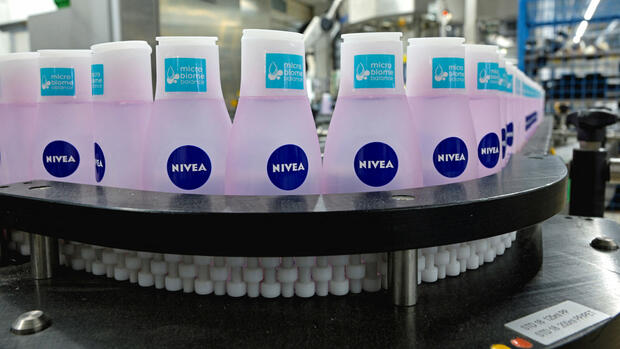Beiersdorf generates most of its sales with the brand.
(Photo: Reuters)
Dusseldorf Thanks to rapid growth in its core brand Nivea, manufacturer Beiersdorf has posted a strong increase in sales. Business with Nivea products and Labello lip care grew by 18 percent in the first quarter of 2023, the Dax group announced on Wednesday. “In March, our brand icon achieved the highest sales month in the history of the brand,” said Beiersdorf boss Vincent Warnery.
Efforts to transform Nivea have clearly paid off, he continued. With its core brand, which accounts for the bulk of sales, Beiersdorf is concentrating on fewer but higher-margin products. These are about face care creams, this area is considered a growth market. Instead of launching new products in individual markets as in the past, the company is now pursuing a global product strategy, which is accompanied by global marketing measures.
>> Read more: New Nivea strategy: fewer products, higher prices, more margin
The Nivea brand grew in all regions, especially in sunscreen creams and deodorants. Beiersdorf benefited from having implemented price increases in retail. Unlike many of its competitors, the group has managed to increase the quantity sold despite higher prices.
In view of the current high cost of living, many consumers often buy cheaper private labels. But when it comes to creams and body care products, many consumers continue to rely on branded goods. Nivea products are also considered to be comparatively cheap.
But Beiersdorf cannot assert itself everywhere: customers cannot currently find any Nivea products at Aldi. The manufacturer is apparently at odds with the discounter in price negotiations. Other brands and supermarkets such as Mars and Edeka also had delivery stops at times in tough negotiations about higher prices.
Strong level growth offsets sales declines at La Prairie. The sales of the luxury brand, which is mainly sold in China, fell by twelve percent, mainly because of the corona lockdowns there.
Turnaround at Beiersdorf
Overall, Beiersdorf, which also owns the adhesives subsidiary Tesa, increased its sales organically by 12.2 percent to EUR 2.5 billion in the first three months. The company had already published this in an ad hoc announcement at the beginning of April.
The new figures confirm a trend reversal at Beiersdorf. In the past decade, the traditional Hamburg group had not grown noticeably in terms of profits or sales. This caused unrest, almost the entire top management was replaced. In 2022, the group achieved double-digit organic sales growth for the first time in two decades.
The group is also optimistic about the future. Beiersdorf also raised its forecast at the beginning of April and is assuming organic sales growth for the year as a whole “in the mid to high single digits”. The raised forecast now appears “conservative”, according to Warnery, who held out the prospect of further growth. Beiersdorf also got off to a good start in the second quarter.
The group expects a return on sales that will “probably slightly exceed” the previous year’s level of 13.2 percent. The consumer goods group does not mention profit figures on the occasion of its quarterly figures.
With such figures, Beiersdorf expects stronger and more profitable growth than its Düsseldorf competitor Henkel. The Persil manufacturer will present its quarterly figures next week.
More: Nivea manufacturer grows by 10.2 percent – dividend remains measly
